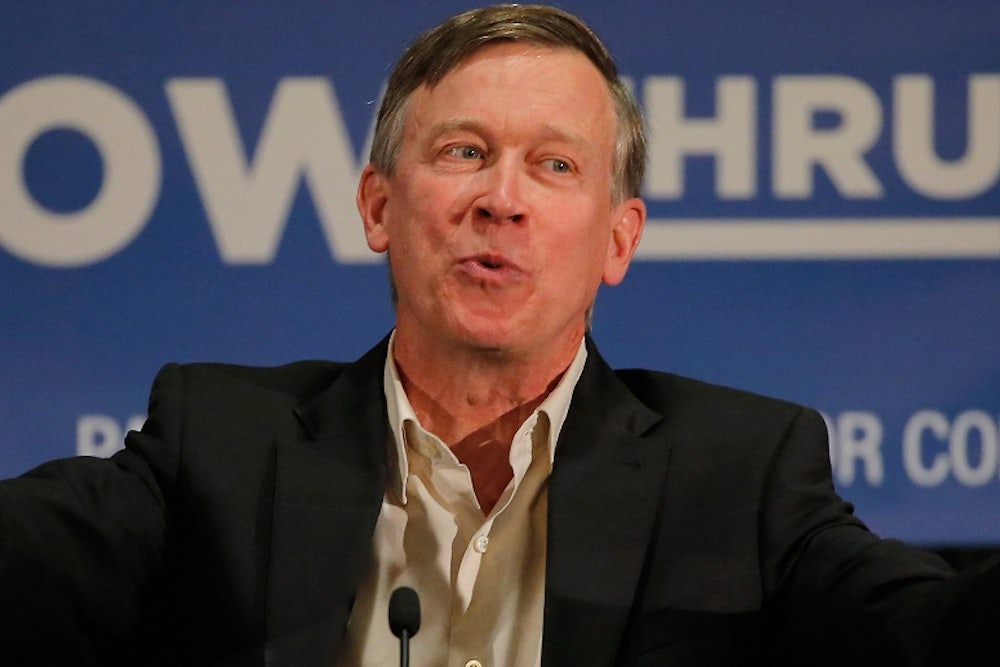It’s hard to pinpoint why Colorado Governor John Hickenlooper is locked in a tough reelection fight against Republican Bob Beauprez. After all, he won the governorship by 14 points in 2010 and is presiding over a fast-growing economy. But one issue largely absent from national debate is looming large in Colorado. That issue is the death penalty.
The source of controversy is the case of Nathan Dunlap, who was sentenced to death for murdering four people at a Chuck E. Cheese in Aurora, Colorado, more than 20 years ago. Dunlap was set to be executed in 2013, but Hickenlooper granted a temporary reprieve as he considered granting him full clemency, citing problems with the way Colorado handles death penalty cases. "Many defendants are eligible for capital punishment but almost none are actually sentenced to death," Hickenlooper said in a statement when he issued the reprieve. "The inmates currently on death row have committed heinous crimes, but so have many others who are serving mandatory life sentences."
Hickenlooper's thinking on capital punishment generally has evolved, as he supported the death penalty in his 2010 race. Republicans have been attacking him for these statements and decisions. And then, a few days ago, the Republican Governor’s Association released an ad featuring Dennis O’Connor, whose daughter was killed by Dunlap. O’Connor says in the scathing spot that he was “robbed of justice” and that the governor is a “coward.”
The ad contains a glaring factual inaccuracy: It claims that clemency “would set [Dunlap] free.” Actually it would merely reduce Dunlap’s sentence to life in prison without parole. The Denver Post has called the ad “preposterous” and the Hickenlooper campaign is demanding a retraction, but the RGA has stood by it so far.
Beauprez has taken up the issue. "When I'm governor, Nathan Dunlap will be executed," he said at a GOP primary debate in May. His campaign has also run a web ad on the issue, saying that Hickenlooper has “stood in the way of justice.”
Hickenlooper has tried to defend himself. At a debate in late September, he reiterated his opposition to capital punishment and explained how he came to that position. “I grew up thinking an 'eye for an eye, a tooth for a tooth' was appropriate, but when you get into it, at least for me, we all deal with our God in a different way,” he said. “But I don't believe the government ought to be taking another person's life.” He refused to say whether he would grant clemency during his remaining months in office if he loses to Beauprez, instead explaining that the state needs to have a “thorough discussion” about the issue and that “down the road that decision [on Dunlap] will get made.”
And while nobody questions whether Dunlap did the killing, many question whether he got a fair trial and whether his mental state should disqualify him from capital punishment. A 2008 article in 5280 magazine detailed some of the issues: Dunlap’s defense attorneys were completely ineffective, refusing to call a single witness in his favor. In his closing arguments, one of Dunlap’s lawyers said, “If you choose to kill my client under the facts of this case, I will respect your decision and you will hear not one word of criticism of you from me.” In 1994, Dunlap had a manic episode where, placed in a rubber-walled room on suicide watch, he would rip off his clothes and rub feces on the walls. After a five-month evaluation with mental health professionals, the state doctor declared that Dunlap was fit for trial. It wasn’t until 1997—after his conviction—that Dunlap was diagnosed with bipolar disorder following a manic episode when he smeared feces all over his mouth. In response to this new information, three jurors signed affidavits saying that they wouldn’t have sentenced Dunlap to death.
Despite these facts, Beauprez is convinced that Dunlap should die—and he has the public on his side. A June 2013 poll found that Coloradoans opposed Hickenlooper’s decision to grant a temporary reprieve, 67-27. That may be one of the reasons that the race is as close as it is.
